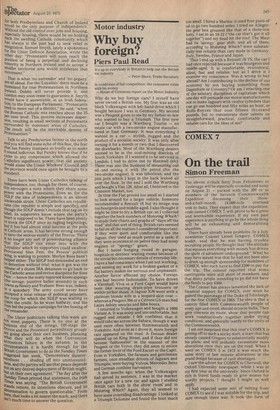Motor industry
Why buy foreign?
Piers Paul Read
It's up to everybody in Britain to help out the British car industry. — Peter Shore, Trade Secretary In conditions of fair competition, the consumer votes with his money.
— House of Commons report on the Motor Industry
Why do we buy foreign cars? I myself have never owned a British one. My first was an old black Volkswagen with left-hand drive which I bought because I was in Germany. My second was a Peugeot given to me by my father-in-law who wanted to buy a Triumph. The first new car I bought was a Wartburg Tourist — an estate car with a two-stroke engine manufactured in East Germany. It was everything I wanted in a car — stylish, rugged and the product of a socialist society. It was only after owning it for a month or two that I discovered the drawbacks. Most of the Wartburg dealers seemed to be in the coal-mining districts of South Yorkshire. If I wanted it to be serviced in London, I had to drive out to Hanwell (sic). There was also the business of measuring out oil and mixing it with the petrol (for the two-stroke engine). It was laborious, and the pint pots which I kept in the back leaked all over the floor. In the end I sold the Wartburg and bought a Fiat 128. After all, I believed in the Common Market, too.
In time the Fiat proved too small so I started to look around for a larger vehicle. Someone recommended a Renault 16 but its image was too bourgeois and middle-aged. I also thought it might be time to try a British car, so I collected together the back numbers of Motoring Which? to study their charts and graphs of "days off the road" and that sort of thing. British cars seemed to fail on all the matters I considered important. If they were quiet and comfortable like the Jaguar, they used as much petrol as a tank; if they were economical on petrol they had noisy engines or "spongy" gears. But I hated hanging round in garages, hospitals or dentists' waiting rooms because of the trivial but necessary details of everyday life. I have a bad conscience when I am not working, and missing my work for a broken gasket or a flat battery makes me nervous and unpleasant. Another factor affected my choice. Foreign cars had become fashionable. To have driven a Vauxhall, Viva or a Ford Capri would have been like wearing, drain-pipe trousers or winkle-picker shoes. A Jaguar XJ6 went with a platinum blonde wife in a leopard-skin coat whereas a Peugeot 304 or a Citroen GS matched Laura Ashley smocks and Biba boots. I returned to Volkswagen and bought a 1600 Variant A. It was noisy and uncomfortable, but rugged and reliable. I felt confident that it would take me across the Sahara, though it was used more often between Hammersmith and Yorkshire. And even as I drove it, more foreign cars appeared on the road. A Datsun dealer opened up on King Street, and if they did not become 'fashionable' in the manner of the Peugeot or the Volvo, they did seem to entice the former lover of the Ford Escort or the Capri. Even in Yorkshire, the farmers and gentleman farmers, once steadfast drivers of Jaguars and Triumphs, were buying Volvos, Mercedes Benz and German combine harvesters.
A few months ago, when the Volkswagen had served its sentence, I was in the market once again for a new car and again I. studied British cars both in the show room and in Motoring Which? Again, they all seemed to have some overriding disadvantage. I looked at a Triumph Dolomite and found the boot much
too small. I hired a Marina: it used four pints of oil to go two hundred miles. I tried an Allegro: the gear box groaned like that of a three-ton lorry. I sat in an 18-22 ("the car that's got it all together") and my head hit the roof. The Maxi had its 'spongy' gear shift; and all of them, according to Motoring Which? were substantially less reliable than cars made in Germany, Italy, Sweden, France and Japan.
• Thus I end up with a Renault 16 TS, the car I had once rejected because it was bourgeois and middle-aged. It is comfortable, economical, silent, fast and reliable, but as I drive it I examine my conscience. Was it wrong to buy abroad? Am I contributing to the decline of our economy by not buying something from Dagenham or Coventry? Or am 1 enacting one of the salutary disciplines of capitalism which one day will persuade our motor manufacturers not to make Jaguars with twelve cylinders that can go one hundred and fifty miles an hour, or Rolls-Royces that cost fifteen thousand pounds, but to concentrate their talents on straightforward, practical, comfortable and reliable cars for the likes of me?


































 Previous page
Previous page